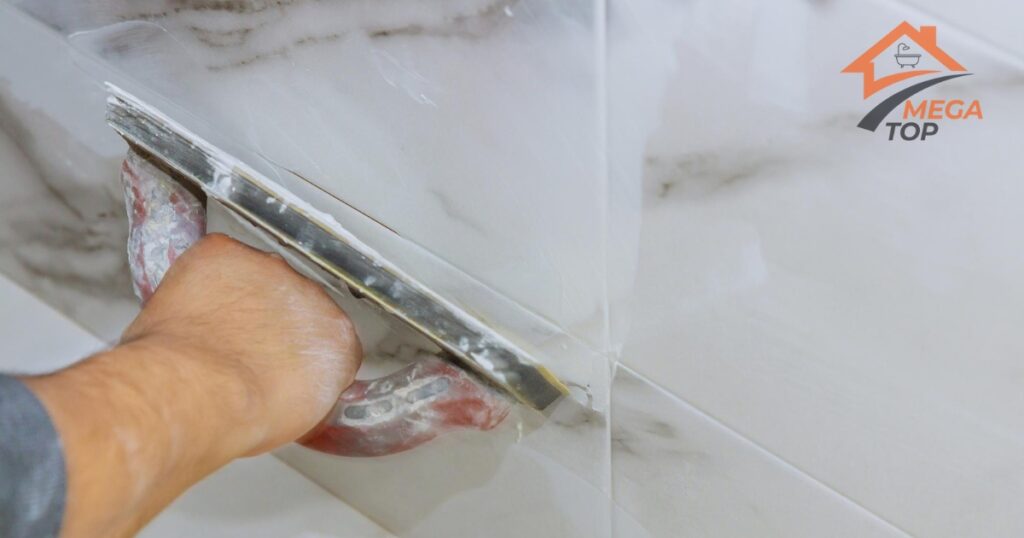INTRO
Choosing the right grout and sealant is just as important as selecting the perfect tiles for a bathroom remodel. While tiles provide the visual appeal, grout and sealant ensure durability, water resistance, and long-term performance. Without proper sealing, grout can absorb moisture, leading to mold, stains, and even structural damage. In this guide, we’ll explore the best grout and sealant options, how to apply them correctly, and expert maintenance tips to keep your bathroom looking flawless.
Why Grout and Sealant Matter for Bathroom Tiles
Grout and sealant serve more than just aesthetic purposes—they are essential for protecting your bathroom tiles. Here’s why:
✔️ Prevents Moisture Damage – Bathrooms are prone to high humidity, and unsealed grout can absorb water, leading to mold and mildew growth.
✔️ Enhances Durability – Properly sealed grout resists stains, cracks, and wear over time.
✔️ Improves Appearance – A good sealant keeps grout looking fresh and prevents discoloration.
✔️ Eases Cleaning – Sealed grout repels dirt and grime, making it easier to maintain.
Types of Grout: Which One Is Best for My Bathroom?
Choosing the right grout type depends on tile material, location, and expected moisture exposure. Here are the three main grout options:
1. Cement-Based Grout
✔️ Most common and affordable
✔️ Available in sanded (for larger joints) and unsanded (for tight joints) versions
❌ Requires sealing to prevent moisture absorption
❌ More prone to staining and cracking
2. Epoxy Grout
✔️ Highly water-resistant – ideal for showers and wet areas
✔️ More durable and stain-resistant than cement grout
✔️ Doesn’t require sealing
❌ More expensive than other grout types
❌ Harder to work with, requiring professional installation
3. Urethane Grout
✔️ Pre-mixed and flexible to prevent cracks
✔️ Water-resistant without sealing
✔️ Stain-resistant and easy to clean
❌ More expensive than cement grout
❌ Requires precise installation for best results
💡 Pro Tip: If your tiles are in high-moisture areas like showers, opt for epoxy or urethane grout for long-lasting protection.
How to Choose the Right Sealant for My Bathroom Tiles
Sealants play a crucial role in preserving the grout and tile surface. The right choice depends on your tile type and level of exposure to moisture.
Penetrating vs. Topical Sealers
🔹 Penetrating Sealers: Absorb into grout, providing long-lasting protection without altering appearance. Ideal for showers and high-moisture areas.
🔹 Topical Sealers: Form a protective layer on the surface. Best for decorative or non-porous tiles, but may wear faster.
Best Sealants for Different Tile Materials
✔️ Porcelain & Ceramic Tiles – Use a penetrating grout sealer, as the tile itself is non-porous.
✔️ Natural Stone Tiles – Require both tile and grout sealing to prevent stains and water absorption.
✔️ Glass Tiles – Only the grout needs sealing, as glass is naturally waterproof.
Bathroom Tile Styles & Trends
A well-chosen grout and sealant enhance the overall style and design of your bathroom. Here are some top trends:
- Contrasting Grout Colors – Dark grout with white tiles creates a bold, modern look.
- Seamless Large-Format Tiles – Requires minimal grout lines for a sleek finish.
- Matte vs. Glossy Finishes – Matte tiles offer a natural, slip-resistant surface, while glossy tiles add elegance.
Step-by-Step Guide: How to Properly Seal Bathroom Grout
Follow these simple steps to seal grout effectively and extend its lifespan:
1️⃣ Clean the Grout Thoroughly – Use a grout cleaner to remove dirt and soap scum.
2️⃣ Allow Grout to Dry Completely – Ensure no moisture is trapped before sealing.
3️⃣ Apply Grout Sealer Evenly – Use a brush or applicator to coat the grout lines.
4️⃣ Wipe Away Excess Sealant – Prevent residue from clouding the tile surface.
5️⃣ Let It Cure – Most sealants take 24-48 hours to fully set.
Common Mistakes to Avoid with Grout and Sealant
🚫 Skipping the sealing step – Cement-based grout needs proper sealing to avoid water absorption.
🚫 Using the wrong sealer – Not all sealants work for all tile types.
🚫 Sealing too soon – Grout should cure for at least 72 hours before applying sealant.
🚫 Neglecting reapplication – Sealant wears off over time and needs periodic touch-ups.
DIY vs. Professional Tile Sealing: Which One Is Better?
DIY Sealing
✅ Cost-effective and easy with the right tools
✅ Works well for small areas and routine resealing
❌ Risk of uneven application or missed spots
Professional Sealing
✅ Ensures even coverage and longer-lasting protection
✅ Recommended for large bathrooms and high-end tiles
✅ Saves time and effort
💡 Pro Tip: If your bathroom has natural stone or intricate mosaic tiles, hiring a professional ensures proper protection and finish.
How to Maintain Sealed Bathroom Tiles
✔️ Use pH-neutral cleaners – Harsh chemicals can degrade the sealant.
✔️ Wipe spills immediately – Prevents stains and moisture buildup.
✔️ Reapply sealant every 1-2 years – In high-traffic areas, frequent resealing ensures durability.
Testimonials from MegaTop™ Customers
⭐ “I never realized how important sealing grout was until my old bathroom tiles started discoloring. MegaTop™ recommended the best sealant, and my tiles still look brand new!” — Cora R., Vineland, NJ
⭐ “I switched to epoxy grout for my shower remodel, and I’ll never go back! No stains, no mold, just easy maintenance.” — Mike L., Tuckahoe, VA
⭐ “MegaTop™ did a fantastic job sealing my natural stone tiles. The water just beads right off, and cleaning is a breeze!” — Brooklyn S., Sarasota, FL
Did You Know?
💡 Did you know that properly sealed grout can extend the life of your bathroom tiles by up to 20 years? Without sealing, moisture can seep in, leading to cracks, stains, and costly replacements!
TL;DR Summary
✔️ Grout and sealant protect bathroom tiles from moisture, stains, and damage.
✔️ Best grout types: Epoxy (most durable), Cement (requires sealing), Urethane (pre-mixed and flexible).
✔️ Sealants prevent water absorption, mold, and staining—essential for tile longevity.
✔️ Reapply sealant every 1-2 years for maximum protection.
✔️ Professional sealing offers longer-lasting results, especially for stone or intricate tile designs.
Want a hassle-free tile sealing experience? MegaTop™ offers professional grout and sealant services to keep your bathroom looking perfect. Contact us today! 🚿✨
Get in Touch
Ready to transform your bathroom with a stunning new floor? Contact us today for a free estimate!
Fill out our online contact form 📧 or call by phone 📞 for a fast response.
We’re here to answer your questions, provide expert advice, and guide you through every step of the process. Call us, email us, or fill out our quick online form to get started. Let’s bring your vision to life!
FAQ
Every 1-2 years, depending on moisture exposure and traffic levels.
You can DIY, but professionals ensure even application and longer-lasting results.
Use pH-neutral cleaners and avoid harsh chemicals like bleach or ammonia.
No! Epoxy grout is naturally waterproof and stain-resistant.
If water no longer beads up and gets absorbed, it’s time to reseal.





